Inspiring stories of families reaping the benefits of the RV lifestyle — including one who chose campground ownership as a vocation.
By Jeff Crider
March 2024
For some families, the thought of camping and RVing with an autistic or special-needs child can be intimidating. However, camping can be as beneficial for these children as it is for everyone else, particularly when parents take a few steps to prepare them for the experience.
That’s the advice of Kara Traxler, who co-owns and operates Dell Pines Campground in Baraboo, Wisconsin, with her husband, Rob, and their daughters, Kortney, Kayla, Josie, and Julia. Julia, who was 16 at the time of this writing, has autism. The Traxlers have taken numerous family RV trips and made many happy memories.
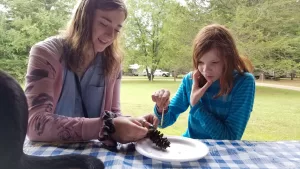
The Traxlers find living and working in a campground is advantageous for the entire family, including Julia (right), who has autism.
“Campers are a friendly lot,” Kara said. “They tend to be very welcoming. That’s been my experience wherever I’ve gone camping. I encourage families [with autistic or special-needs children] to give it a try. You don’t have to go to a special-needs campground to have fun as a family.”
With their wide-open spaces, campgrounds provide terrific environments for children with autism and other special needs, Kara said. The kids feel less restricted and can get up and walk around or play along the edges of an activity.
Preparation is key, however, and Kara says it’s important to take some time to introduce your autistic or special-needs child to the idea of an RVing experience. For starters, she shared the following tips:
Prepare your child for the trip. “Talk with them ahead of time,” Kara said. “A lot of these kids aren’t verbal, but they still understand. Tell them: ‘We’re going to take a camping trip, and this is what’s going to happen. Which favorite outfit, blanket, and toys should we bring?’”
Practice in your RV. Set up your child’s sleeping spot. Spend small increments of time in the RV — however long the child remains comfortable — and slowly introduce them to their new special space.
Camp overnight in your driveway the first time. “I think this kind of practice is very important. Every kid has comfort things they like to have around them, and camping at home reveals those things you might have forgotten to pack,” Kara said. For instance, Julia will only drink out of straws, so Kara always takes along plenty of them when they go camping.
Be flexible and patient. “We have a picture in our minds of the perfect campfire and the perfect s’mores,” Kara said. “But even though Julia hates having sticky stuff on her hands, we still have s’mores together. We just learned to give her a wet washcloth when we have s’mores so she can wipe her fingers as she eats.”
Bring items to enhance your child’s camping experience. For instance, Julia doesn’t like bugs, so the Traxlers have given her a fly swatter of her own.
Revisit the places you enjoy. “Your child will find a place they like to camp, and they will want to come back to that place, and that makes it easier to have a family camping experience there,” Kara said.
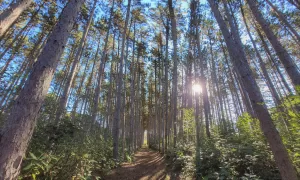
Rob and Kara were sold on the property as soon as they saw the towering pines.
Remember the rest of the kiddos in the family. One ongoing challenge for families with special-needs children is ensuring that every child receives ample parental attention. This is important to remember during camping trips as well. Kara suggests switching off parents and having one stay with the special-needs child while the other does something with the rest of the kids. She also noted that their family has been blessed to have the grandparents come along on trips, too.
The Traxlers discovered through their own experiences with Julia that RVing with a special-needs child is feasible and enjoyable as a family activity. And they’ve also found that a campground provides a safe environment where Julia can grow up and interact with other people. In fact, when the Traxlers decided to purchase Dell Pines Campground five or so years ago, they did so in part with Julia’s future in mind, as they believe it could provide employment for her as an adult.
Before they purchased Dell Pines, the Traxlers owned and operated a canoeing business along the Baraboo River for nearly a decade. “That’s how we got the bug for outdoor hospitality,” Kara explained. Along the way, they had considered adding a campground to the business.
Problems with river flows made their canoeing business untenable long-term, and the couple eventually found employment elsewhere. Rob went to work in transformer sales and Kara in health education, directing an organization that helped develop physician residency programs in rural areas of Wisconsin.
Rob ultimately realized he wasn’t suited for a desk job, and Kara kept coming back to the idea of owning and operating a campground.
“On May 1st of 2018, I sent my husband a text just after my drive to work,” Kara said. “A few days previous, he had expressed that he was ready to work for himself again. I texted, ‘We’re not getting any younger. It’s time to get a campground,’ and his return text said simply, ‘I’m in.’”
The Traxlers initially aimed to purchase a campground in northern Wisconsin’s Northwoods region. “To us,” Kara said, “going camping means going Up North — there’s unending trees and less people.”
But their real estate broker insisted they consider a campground near their home in Baraboo, although they thought it would be too expensive. The family who owned the campground was ready to retire and wanted to sell it to another family.
While skeptical at first, the Traxlers said that as soon as they drove through Dell Pines Campground, they knew it was their destiny. With all the old pine trees, it reminded them of the Northwoods.
Purchasing a campground in Baraboo rather than elsewhere proved to be beneficial for Julia. “We did not have to move our daughter. She got to stay in the same school, the same church, and the same community,” Kara said.
It also meant retaining access to Julia’s health-care providers. “You spend years trying to get a good team of doctors [for an autistic child]. A remote rural area wouldn’t have people like that,” Kara said.
The Traxlers have found living and working at a campground to be advantageous for the whole family. They stay in the manager’s quarters on a corner of the 40-acre campground property. “This allows us to take walks and bike rides with Julia in a safe and familiar environment,” Kara said.
“We hadn’t anticipated how much joy Julia would have meeting other campers and their dogs,” Kara shared. She added that Julia’s preferred activities — like doing puzzles, coloring, and watching dog training videos on YouTube — don’t lend themselves to her being physically active, but she loves to mingle with the canines. “She’ll say, ‘Can we go for a walk and see all the dogs?’”
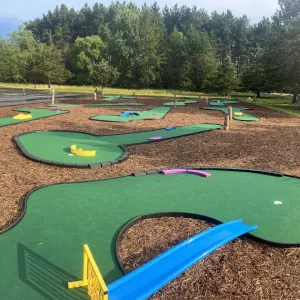
Since purchasing Dell Pines Campground, the Traxlers have added mini golf course, pickleball and basketball courts, and walking trails.
During their strolls, Julia asks campers their dog’s name, and whether the pet knows how to do a certain trick.
“It gets her out of the house,” Kara said, “and the campers are so kind to her, especially the wonderful community of seasonal campers we have here.” In many ways, the folks who spend the whole summer at Dell Pines Campground have become Julia’s extended family.
Dell Pines Campground was built around 1970. During their first years of ownership, the Traxlers focused on making improvements and replacing equipment. This included adding seven cabins, a miniature golf course, and pickleball and basketball courts, as well as walking trails.
Although campground ownership requires considerable work, the Traxlers say they were lucky to find a business where they do so together as a family. At the time of this writing, Dell Pines Campground had 155 campsites, including 11 cabins, but the Traxlers plan to add more.
“We don’t have a lake or river. But we’re 1.5 miles from Mirror Lake State Park, which has amazing kayaking opportunities and hiking trails, and only a few more miles from Devil’s Lake State Park with its breathtaking views,” Kara said. “We also have a barrel-train ride, which is something autistic kids love. We have a couple of seasonal campers with special-needs kiddos who attend our craft activities.”
The Traxlers also schedule themed weekends and doggie parades, as well as a chapel service on Sundays during the summer.
“It was a lifestyle choice for us to be able to work together as a family and be together, instead of going our separate ways every day,” Kara said. “I’m not saying it’s easy. But this just adds so many wonderful layers [of experience to our lives]. It’s so much richer because of the relationships we have, because of the activities and options we have each day.”
“It’s not an easy life, but it’s a rich life,” she said. “And if our lives inspire a few families [with special-needs children] to give camping a try, it will be worth it.”
CAMPGROUND INFO
Dell Pines Campground, C14372 *
E10562 Shady Lane Road
Baraboo, WI 53913
dellpines.com
(608) 356-5898
*FMCA commercial member
MEET THE BERIGAN FAMILY
Before their children were born, Katie and Doug Berigan were avid travelers, both nationally and internationally.
“We were people who always traveled,” Katie said. “We weren’t homebodies.”
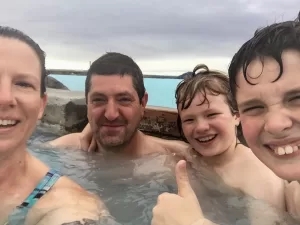
The Berigan family
But when they started taking road trips with their first child, Seamus, at age 3 or 4, they noticed he would get violently ill on the first day of their trip, regardless of where they were going.
“Seamus has a bulletproof immune system,” Katie said. “But [whenever we took a trip] he would get a fever that would spike and last about an hour, and then he would vomit, and it would go away.”
Seamus would get sick even when they traveled to attend family get-togethers in different cities.
The Berigans suspected Seamus might have autism, because of behaviors he exhibited that are common to autistic children, such as becoming obsessed with certain things and having difficulties transitioning. Doctors wouldn’t test Seamus for autism until he was older, however. They initially treated him for anxiety and attention deficit hyperactivity disorder (ADHD). He eventually was diagnosed with high-functioning autism at age 10.
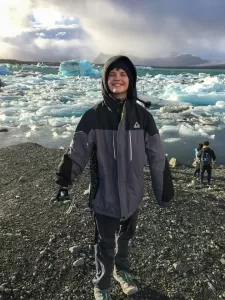
Katie and Doug Berigan credit RV trips with providing their autistic son, Seamus, a level of comfort that led them to expand their horizons.
Several years before doctors confirmed Seamus’ diagnosis, the Berigans made an interesting discovery: When they took him on camping trips using a pop-up trailer they borrowed from their neighbors, he was fine.
“We discovered that when we took our home with us, he didn’t get sick,” Katie said.
Intrigued by this, the Berigans subsequently purchased their own pop-up camping trailer and later upgraded to a conventional travel trailer. They used both to take trips to various destinations across the Midwest. “With autism, a common trait is to want sameness,” Katie said. She noted that having their own RV provides a level of comfort for Seamus that has enabled him to enjoy the family RVing experience.
But Katie said something else happened as a result of their frequent RV trips with Seamus: “It normalized traveling for him,” she said — so much, in fact, that the Berigans now not only take family RV trips with Seamus and their younger son, Kieren, but they also enjoy trips overseas using a variety of accommodations.
About 6 years ago, the family took a trip to Ireland and Scotland, where they stayed in a mix of hotels and Airbnbs. In 2018, they traveled to Iceland, where they rented a Type C motorhome. Seamus was 9 at the time. Beforehand, Katie spoke with a psychologist, who suggested they stay at each place for three or four days before moving on to the next destination.
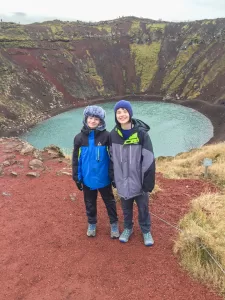
The Berigans journeyed to Iceland, where they rented a small motorhome.
“I don’t think we could have done that without the pop-up experience, which made travel a positive experience for us,” Katie said.
At the time of this writing, the Berigans were spending the summer as seasonal campers at Dell Pines Campground. Katie shared that being in the woods and watching the birds soothes Seamus, who likes to sit and watch the animals.
The Berigans also enjoy family trips to Devil’s Lake State Park, not far from Dell Pines Campground. They recently took a family hike and climbed a 500-foot bluff to watch the sunset. “Seamus enjoys those activities in nature,” Katie said.
And thanks to their positive experiences RVing, the Berigans are also planning another family trip to Europe with Seamus and Kieren soon.
